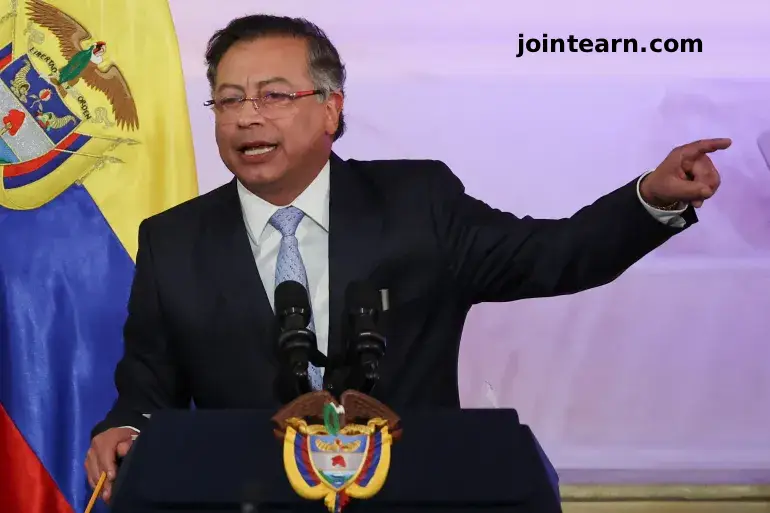
The government of Colombia has recalled its ambassador to the United States, marking a dramatic escalation in diplomatic tensions between Bogotá and Washington. The move comes after US President Donald Trump publicly branded Colombian President Gustavo Petro an “illegal drug leader” and threatened to cut off American aid to the South American nation.
A Rapidly Deteriorating Relationship
In a statement on Monday, Colombia’s Ministry of Foreign Affairs confirmed that Ambassador Daniel García-Peña had been summoned back to Bogotá for “urgent consultations” with President Petro. Officials said the decision reflects the government’s “deep rejection” of Trump’s comments and recent US military actions in the region.
The ministry noted that García-Peña had already landed in Bogotá and would “report directly to the president and the foreign minister regarding the current state of bilateral relations.”
Trump’s Remarks Spark Outrage
The diplomatic spat erupted after President Trump posted a series of messages on his social media platform on Sunday, accusing Petro of failing to tackle narcotics trafficking and claiming that US financial support to Colombia would be “terminated immediately.”
“If Petro won’t stop the drugs, we will — and it won’t be done nicely,” Trump wrote, implying potential unilateral US action in Colombian territory.
His remarks triggered backlash in Colombia, where senior officials denounced them as “threats of invasion.”
Interior Minister Armando Benedetti condemned Trump’s statements, saying they represent “a threat of military intervention against a sovereign state.”
“I can’t imagine closing down drug production sites in Colombia unless it’s through force or invasion — and that’s exactly what he’s suggesting,” Benedetti told reporters in Bogotá.
Controversial US Strikes Intensify Tensions
The verbal clash comes on the heels of controversial US strikes in the Caribbean, which Washington claims targeted vessels linked to drug smuggling operations originating in Venezuela and Colombia.
According to the Trump administration, the naval operations were part of an intensified campaign against what it described as “narco-terror networks.” However, the strikes — which reportedly killed dozens of people — have drawn condemnation from multiple Latin American governments and international law experts who call them illegal acts of aggression.
President Petro reacted sharply on social media, accusing the US of violating Colombia’s sovereignty. He said one of the victims of the strikes was a Colombian fisherman, Alejandro Carranza, who “had no connection to drug trafficking.”
“US government officials have committed murder and violated our territorial waters,” Petro wrote on Sunday night. “This is a direct attack on the sovereignty of Colombia and the dignity of its people.”
Longstanding Strains in US–Colombia Relations
Relations between the two countries — traditionally strong allies in security and counter-narcotics cooperation — have been strained since Trump returned to office in 2025.
Petro, Colombia’s first leftist president, has pushed for a new approach to drug policy, emphasizing rural development and decriminalization over militarized eradication campaigns. His stance has clashed with Washington’s long-standing “war on drugs” strategy, which Trump has vowed to reinstate.
In recent months, Trump has accused Petro’s government of being “soft on crime” and alleged that “cartels are running freely under his watch.” Petro, in turn, has condemned what he calls “imperialist meddling” by the United States in Latin America.
The latest exchange marks the lowest point in relations since Petro took office in 2022.
Possible Fallout and Next Steps
Analysts say Colombia’s decision to recall its ambassador is a serious diplomatic measure — often a precursor to freezing or downgrading bilateral ties.
“This is a significant escalation,” said Maria Fernanda Torres, a political scientist at Universidad del Rosario in Bogotá. “It signals that Colombia is no longer willing to tolerate personal insults or extrajudicial military actions carried out by the United States.”
The White House has not yet issued an official response to the ambassador’s recall, but a State Department spokesperson told reporters that “the United States values its partnership with Colombia” and hopes to “resolve differences through diplomatic channels.”
However, Petro’s administration is reportedly preparing to formally protest the U.S. naval strikes at the United Nations and the Organization of American States (OAS).
Regional Reactions
Several Latin American leaders have expressed solidarity with Petro, warning against U.S. overreach in the hemisphere.
Mexican President Claudia Sheinbaum condemned Trump’s remarks, calling them “unacceptable language that undermines diplomacy.” Brazil’s Luiz Inácio Lula da Silva urged both nations to “restore dialogue and respect sovereignty.”
Venezuela’s government, a frequent target of U.S. sanctions and military pressure, also weighed in, accusing Washington of “reviving colonial policies under the guise of anti-drug operations.”
A Diplomatic Rift with Global Implications
The unfolding confrontation between Bogotá and Washington could have far-reaching consequences for U.S.–Latin America relations.
Colombia has long been one of Washington’s closest partners in the region, receiving billions in security and counter-narcotics aid under programs like Plan Colombia. If the situation deteriorates further, experts warn that the security cooperation framework between the two countries could unravel, affecting joint anti-trafficking operations and regional stability.
“Colombia’s recall of its ambassador sends a clear message: the era of automatic alignment with Washington’s policies is over,” said analyst Torres. “This dispute may reshape the balance of power across Latin America.”


Leave a Reply